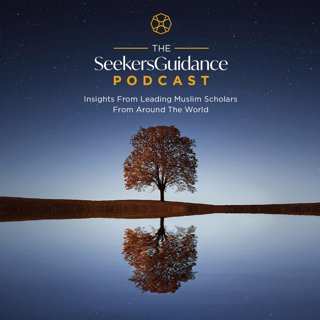
06: Fasting – Renewing Religion: An Overview of Ghazali’s Ihya – Shaykh Faraz Rabbani
In this lesson, Shaykh Faraz continues his review of Imam Ghazali’s Ihya with an overview of the chapter on fasting. Imam Al-Ghazali covers both the religious guidance related to fasting as well as the spiritual meanings of fastings. This is so that we can act with intent and understanding of why we engage in the worship that we do. Shaykh Faraz previews Imam Ibn ‘Ajiba’s tafsir of the Fatiha. In the verse “It is You alone we worship and it is You alone we depend upon” (إِيَّاكَ نَعْبُدُ وإِيَّاكَ نَسْتَعِينُ). This verse outlines that we should only focus our intent on Allah alone when we engage in fasting. Furthermore, we should only rely on Allah to complete our fasts as well. Shaykh Faraz details in his talk the benefits of fasting: [1] One of the benefits of fasting weakens our mere humanness and the material world. Excessive eating and drinking makes heavy our attachment to the material world and the more the material world is real to us the more the subtle reality of spiritual meanings are veiled to us. [2] A second benefit is that it upholds the Divine characteristic of Al-Samadiyyah (Allah is free of all need). When we recognize our complete neediness to Allah through fasting we can also recognize the One who is free of all need. [3] It purifies and softens the heart. Fasting gets you to recognize your weakness which purifies and softens our hearts to turn to Allah. [4] Fasting facilitates feeling lowly and humbled and ridding oneself of arrogance. The lower self is not humbled by anything like hunger. [5] It breaks one’s desire for sin and diminishes the control of one’s lower self over them. Fasting restrains one from certain desires and facilitates refraining from certain sins. [6] Fasting facilitates one having more time for one to focus their time on the spiritual instead of the material. [7] Fasting directs one towards to contemplation. [8] It is a shield from the Shaytan. (For an answer to the question of whether the Shaytan is chained during Ramadan: https://seekersguidance.org/answers/general-counsel/chaining-of-the-devils-in-ramadan/) Shaykh Faraz continues to explain that there are three levels of restraint that one can strive for while fasting: [1] Food and Drink [2] All the things that are displeasing to Allah [3] All the things that distract us from Allah Lastly, the lesson concludes with a reminder that the believer should seek to be with Allah even when they are with people, such that their heart is always busied with Allah no matter what else they are doing of worldly things. In this brief overview of Imam Ghazali’s opus magnum, Ihya Ulum al-Din (Renewing the Religious Sciences), this series will serve as blueprint for how the believer can bring to life their religion. It will aim to help the believer to not just practice the form of the religion properly, but to also practice it with excellence. Join our Ramadan 2017 program: #RamadanRenewal, in-person at SeekersGuidance Toronto or online through the SeekersGuidance Global platform. For more details, visit: https://seekersguidance.org/ramadan. Checkout all of the SeekersGuidance podcasts by visiting https://seekersguidance.org/podcasts/
2 Juni 201728min

Ramadan Fasting: Quran Exegesis Based on Ghazali’s Ihya
Embark on a profound journey of understanding with Shaykh Faraz as he delves into the timeless wisdom encapsulated within the Quranic verses concerning fasting and guidance. In this enlightening podcast, Shaykh Faraz explores verses 183-186 of Surat al-Baqara, unraveling the spiritual depth and practical insights they offer. Beginning with verse 183, Shaykh Faraz elucidates the significance of fasting as a means to attain mindfulness of Allah, shedding light on the concept of taqwa and providing invaluable guidance on cultivating it in our lives. Moving forward to verse 185, Shaykh Faraz unveils the true essence of Ramadan, emphasizing its role as the month of Quranic revelation and a time for acknowledging Divine mercy and ease, fostering gratitude within our hearts. Lastly, in verse 186, Shaykh Faraz invites listeners to contemplate the immediate closeness of Allah, exploring the profound implications of His responsiveness to our calls and the transformative power of sincere belief. Throughout this, Shaykh Faraz draws connections between the Quranic verses and the thematic order of Imam Ghazali’s Ihya ‘Ulum al-Din, offering a comprehensive framework for spiritual renewal and deepening our connection with the guidance of the Quran. Join us on this illuminating journey of reflection and renewal as we seek to align our lives with the profound wisdom of the Quran and experience a transformative renewal by The Book. Check out all of the SeekersGuidance podcasts by visiting us here.
1 Juni 201721min

05: Zakat & Charity – Renewing Religion: An Overview of Ghazali’s Ihya – Ustadh Amjad Tarsin
In this lesson, Ustadh Amjad Tarsin gives an overview of the chapter on zakat (alms) and charity from the Ihya Ulum al-Din (Renewing the Religious Sciences), the fifth chapter. He highlights the adaab (etiquettes) of giving charity that Imam Al-Ghazali mentions in this chapter. Ustadh Amjad also emphasizes the importance of learning the fiqh (legal rulings) of giving zakat, as well as all the other actions of worship that are personally obligatory. Imam Ghazali says about zakat that it is one of the tests that Allah has placed for the believers. It is also one of the foundational pillars of Islam. Imam Ghazali then says that one of the wisdoms of the obligation of zakat, is because wealth is beloved to people. So sacrificing what is beloved for the sake of Allah is a sign and indication of loving Him. He then goes to outline the different levels of people who give charity. The highest level is to give everything for the sake of Allah Most High, unconditionally. At that level, Ustadh Amjad recounts the example of Abu Bakr as-Siddiq (may Allah be pleased with him), who gave all of his wealth to the Prophet peace and blessings be upon him for the benefit of the Muslims. Ustadh Amjad then looks at some of the adaab (etiquettes) that Imam Ghazali mentions about giving out zakat and charity. The first one he mentions is giving charity secretly, and the great merit in doing so. Giving charity in private is closer to sincerity and guards from falling it showing off and ostentation. He gives the example of Imam Ali Zain al-Abidin the great grandson of the Prophet (peace and blessings be upon him), and how he used to personally carry money to the poor in the depths of the night. Another etiquette Ustadh Amjad highlights is to not destroy charity by holding oneself in favour over the person they gave the charity to. Allah says in the Quran that doing so, nullifies the charity and hurts the receiver of charity. Imam Ghazali mentions that cure for this, is for the one giving charity to see themselves as the ones being in need of help and favour by giving charity. Finally, Ustadh Amjad advises that when giving charity, one shouldn’t expect anything in return, and do it purely for the sake of Allah, as is mentioned in the Quran. He explains also that one shouldn’t fear decrease in wealth because of giving charity. Rather, the reality is that it is a means of increase and blessing in one’s wealth. In this brief overview of Imam Ghazali’s opus magnum, Ihya Ulum al-Din (Renewing the Religious Sciences), this series will serve as blueprint for how the believer can bring to life their religion. It will aim to help the believer to not just practice the form of the religion properly, but to also practice it with excellence. Join our Ramadan 2017 program: #RamadanRenewal, in-person at SeekersGuidance Toronto or online through the SeekersGuidance Global platform. For more details, visit: https://seekersguidance.org/ramadan. Checkout all of the SeekersGuidance podcasts by visiting https://seekersguidance.org/podcasts/
1 Juni 201723min

05: Charity & Zakat – Renewal by the Book: Quran Tafsir on Imam Ghazali’s Based Ihya – Shaykh Faraz Rabbani
In the fifth lesson on Quranic reflection and tafsir, Shaykh Faraz reflects upon two verses (103-104) from Surat al-Tawba on giving to charity, and the ultimate purpose of charity. The verses correspond to the fifth book Imam Ghazali’s Ihya on zakat. In these verses, Allah commands the Prophet, peace be upon him, and through it commands all of us: “Take from their wealth a charity that will purify them and increase them through it; and pray for them for your prayers are serenity for them; and truly Allah is Hearing and Knowing” (خُذْ مِنْ أَمْوَالِهِمْ صَدَقَةً تُطَهِّرُهُمْ وَتُزَكِّيهِمْ بِهَا وَصَلِّ عَلَيْهِمْ ۖ إِنَّ صَلَاتَكَ سَكَنٌ لَهُمْ ۗ وَاللَّهُ سَمِيعٌ عَلِيمٌ) “Do they not know that it is Allah that accepts repentance from His servants and He takes charity; and that Allah it is He who is the Relenting and Compassionate.” (أَلَمْ يَعْلَمُوا أَنَّ اللَّهَ هُوَ يَقْبَلُ التَّوْبَةَ عَنْ عِبَادِهِ وَيَأْخُذُ الصَّدَقَاتِ وَأَنَّ اللَّهَ هُوَ التَّوَّابُ الرَّحِيمُ) Scholars detail that the charity referenced in these verses is that of obligatory Zakat. What then is the purpose of zakat? Allah mentions that is intended for purify them and to increase them through it. Zakat purifies three things: your wealth, your actions and your heart from being miserly and needy of this world. In the second verse, Allah commands us to have certainty accepts the repentance of His servants. One should also have certainty that Allah accepts charity if it is given sincerely to Allah. Do not give it thinking that it is you that is benefiting that person instead one should have gratitude for Allah facilitating that you give and benefit from your charity. Finally, Shaykh Faraz reminds us to focus our actions, not on the action itself; rather, on Allah by bringing to mind the names and attributes of Allah. Thus, busy yourself with Allah before, during and after an action of Good. The greatest charity is for a person to give themselves to Allah. In this series Shaykh Faraz will be looking at points of reflection from key verses in the Quran. The series will follow the thematic order of Imam Ghazali’s Ihya Ulum al-Din (Renewing the Religious Knowledges). The aim is to connect the key verses of guidance from the Book of Allah with the blueprint of renewal, the Ihya, so that we experience a renewal by The Book. Join our Ramadan 2017 program: #RamadanRenewal, in-person at SeekersGuidance Toronto or online through the SeekersGuidance Global platform. For more details, visit: https://seekersguidance.org/ramadan. Checkout all of the SeekersGuidance podcasts by visiting https://seekersguidance.org/podcasts/
31 Maj 201722min

04: Prayer – Renewing Religion: An Overview of Ghazali’s Ihya – Ustadh Amjad Tarsin
In this lesson, Ustadh Amjad Tarsin reviews the chapter on prayer from the Ihya Ulum al-Din (Renewing the Religious Sciences), the fourth chapter. Imam Al-Ghazali emphasized the importance of both the outward and inward in prayer. This condition is in line with the purpose of prayer and that is remembrance of Allah. Imam Al-Ghazali adds in his book that a condition of prayer to be in a state of awe, humility and presence in prayer. This condition had not been previously included by the jurists in their detailing of the conditions of prayer. The Prophet, peace and blessings upon him, said: “Whoever’s prayer does not prevent them from vile things and bad things, they have not increased with Allah anything except distance.” The purpose of i’bada (worship) is therefore taqwa. That is why one’s character needs to be inline with their outward performance of worship. Ustadh Amjad illustrates this point using various examples and stories of the companions and righteous people, may Allah be pleased with them. Imam Al-Ghazali continues to explain that every action within prayer has a purpose and the overarching goal is to have the utmost reverence of Allah through both the heart and the body. That is why during prostration one humbles the most honored part of our being, our face, to our Lord. Ustadh Amjad goes on to explain the two causes of distraction during prayer and their remedies: [1] Outward distractions that can be avoided by seeking out a quiet places. [2] Inward distractions which are more difficult to overcome. The way to deal with this is through preparation before beginning prayer by remembering the hereafter and standing before Allah and the severity of the outcome of that day. As well as freeing yourself of any worldly responsibilities prior to prayer so you are not rushed during prayer. Lastly, Ustadh Amjad reminds the audience that the main purpose of prayer is to bring you closer to Allah and remove the veils (of all worldly things) between you and Him. As such we need to free ourselves of the distractions and bring our hearts to be more present with Allah during prayer and if we do that our prayer will be transformative. In this brief overview of Imam Ghazali’s opus magnum, Ihya Ulum al-Din (Renewing the Religious Sciences), this series will serve as blueprint for how the believer can bring to life their religion. It will aim to help the believer to not just practice the form of the religion properly, but to also practice it with excellence. Join our Ramadan 2017 program: #RamadanRenewal, in-person at SeekersGuidance Toronto or online through the SeekersGuidance Global platform. For more details, visit: https://seekersguidance.org/ramadan. Checkout all of the SeekersGuidance podcasts by visiting https://seekersguidance.org/podcasts/
31 Maj 201723min

03: Purification – Renewing Religion: An Overview of Ghazali’s Ihya – Ustadh Amjad Tarsin
In this episode, Ustadh Amjad Tarsin continues this series on Imam Ghazali’s Ihya Uloom ud-Din, with an overview of the Book of the Mysteries of Purification. Imam Al-Ghazali highlights both the outward and inward importance of purification. Imam Al-Ghazali explains both the rulings of purifications from a fiqh perspective and the inner secrets of purification. The chapter begins by describing that the Quranic verses and Hadiths that detail the benefits and rewards for purification. The purification that is intended here is at the basic level the purification of the limbs. However purification has 4 degrees: [1] Purifying the outward from impurities and vile things. [2] Purifying your limbs from sins and corruption [3] Purifying the heart from blameworthy characteristics and destructive qualities [4] Purifying your inner most core of your being from everything other than the Exalted. The degrees described above correspond with the degrees of faith and a person will not be able to attain a higher level without attaining the one below it first. When one cleans their limbs they are purifying that which people see, as such, one should be ashamed of facing Allah without purifying your heart upon which Allah gazes. Lastly, Ustadh Amjad emphasizing that delving into the deeper levels of purification takes work and practice. As you work on these deeper levels of purification you will become someone who is always aware of being in the presence of Allah at all times. In this brief overview of Imam Ghazali’s opus magnum, Ihya Uloom ud-Din (Renewing the Religious Sciences), this series will serve as blueprint for how the believer can bring to life their religion. It will aim to help the believer to not just practice the form of the religion properly, but to also practice it with excellence. Join our Ramadan 2017 program: #RamadanRenewal, in-person at SeekersGuidance Toronto or online through the SeekersGuidance Global platform. For more details, visit: https://seekersguidance.org/ramadan. Checkout all of the SeekersGuidance podcasts by visiting https://seekersguidance.org/podcasts/
30 Maj 201721min

04: Establishing Prayer – Renewal by the Book: Quran Tafsir Based on Imam Ghazali’s Ihya – Shaykh Faraz Rabbani
In this episode, Shaykh Faraz highlights verse 14 of Surah Taha (Chapter 20), which is about establishing prayer out of remembrance: (إِنَّنِي أَنَا اللَّهُ لَا إِلَٰهَ إِلَّا أَنَا فَاعْبُدْنِي وَأَقِمِ الصَّلَاةَ لِذِكْرِي) “Truly, I am Allah. There is no god but me. So worship Me and establish prayer out of My remembrance.” Shaykh Faraz goes on to explain that the reason for prayer is remembrance of Allah. Within that there are three levels of remembrance: [1] those who worship seeking to remember, [2] those who worship in remembrance, and [3] those who worship out of remembrance. All of these levels are implicit in this verse. There are 4 considerations to why we worship: [1] What is worship? - That which is expressed by the slave towards their master. [2] Who is the One worshiped? - Allah Most High ; the act of worship is not about the act itself, the one praying but about the One being prayed to. Allah, the Creator and Sustainer of all things. [3] Who is the worshiper? - Slave of Allah: in absolute existential neediness of Allah. Worship: expression of neediness -- only means of fulfillment of inherent neediness. [4] What is the act of worship? - Prayer expresses neediness in the most comprehensive of ways because it is both inward and outward engaging both heart and limbs. Prayer expresses need, turning and presence with the One you are praying to. Lastly, Shaykh Faraz emphasizes that one must prayer in the same way that the Prophet Muhammad (peace and blessings be upon him) did. No one expressed neediness of Allah, turning towards HIm and presence with Allah like the Prophet (peace and blessings be upon him) did. We must, as believers, strive to uphold the outward manifestations of prayer because they are the containers of the meaning of presence, that is prayer. In this series Shaykh Faraz will be looking at points of reflection from key verses in the Quran. The series will follow the thematic order of Imam Ghazali’s Ihya Uloom ud-Din (Renewing the Religious Knowledges). The aim is to connect the key verses of guidance from the Book of Allah with the blueprint of renewal, the Ihya, so that we experience a renewal by The Book. Join our Ramadan 2017 program: #RamadanRenewal, in-person at SeekersGuidance Toronto or online through the SeekersGuidance Global platform. For more details, visit: https://seekersguidance.org/ramadan. Checkout all of the SeekersGuidance podcasts by visiting https://seekersguidance.org/podcasts/
30 Maj 201721min

03: Purification & Repentance – Renewal by the Book: Quran Tafsir Based on Imam Ghazali’s Ihya – Shaykh Faraz Rabbani
In this lesson, Shaykh Faraz highlights verses 222 of Surat al-Baqara, and how it corresponds to the third chapter of Ghazali's Ihya on purification. (إِنَّ اللَّهَ يُحِبُّ التَّوَّابِينَ وَيُحِبُّ الْمُتَطَهِّرِينَ) (Truly, Allah loves the oft-repentant and He loves those who purify themselves completely). Shaykh Faraz explains that repentance (tawba) is return (ruju'). He outlines the different levels of return: [1] from disbelief to belief, [2] from sin to submission, and [3] from distance to closeness. Resource: A Reader on Tawba (Repentance) https://seekersguidance.org/answers/general-counsel/a-reader-on-tawba-repentance/ Shaykh Faraz then explains that purification is the removal of impurities, both physically and spiritually. He tells us that there is a link between physical and spiritual purity. Some of the wisdoms of ritual purity is to assist the presence of heart, it's expiatory, it nurtures God-consciousness, mindfulness, restraint and lumination. Shaykh Faraz then highlights the explanation of the verse by Imam al-Qushayri. He says that those being referred to in the verse are on different levels. On one level they are those who repent from sins, and purify themselves from blameworthy traits. On another level, they are those who repent from the blameworthy, and purify themselves from distractions. On yet another level, they are those who repent with the water of seeking forgiveness, and purify themselves with the effulgent water of shame and brokenness. Finally, they are those who repent from slips and purify themselves from heedlessness. Finally, Shaykh Faraz concludes with the story of one of the early imams of Islam, Imam al-Junaid and how he defines repentance. He tells us that repentance is to forget about the sin after repentance out of rejoicing in Allah's favour and mercy. Resource: Tafsir al-Qushayri http://www.greattafsirs.com/Books/lataif.pdf In this series Shaykh Faraz will be looking at points of reflection from key verses in the Quran. The series will follow the thematic order of Imam Ghazali's Ihya Uloom ud-Din (Renewing the Religious Knowledges). The aim is to connect the key verses of guidance from the Book of Allah with the blueprint of renewal, the Ihya, so that we experience a renewal by The Book. Join our Ramadan 2017 program: #RamadanRenewal, in-person at SeekersGuidance Toronto or online through the SeekersGuidance Global platform. For more details, visit: https://seekersguidance.org/ramadan. Checkout all of the SeekersGuidance podcasts by visiting https://seekersguidance.org/podcasts/
29 Maj 201717min





















